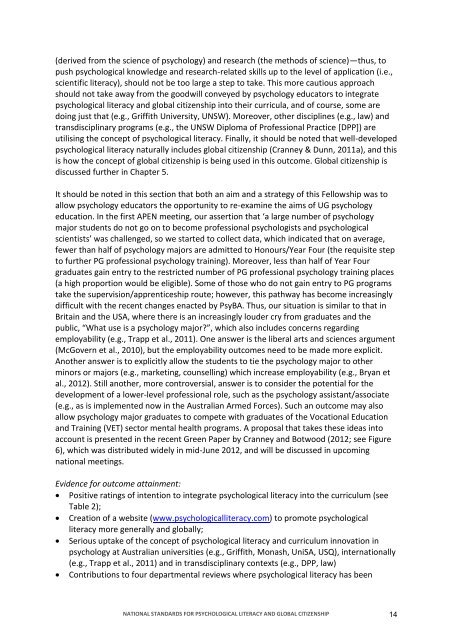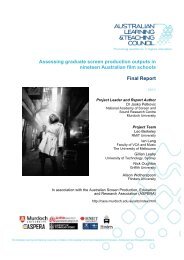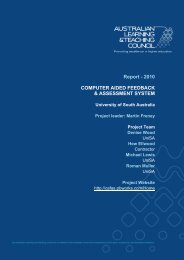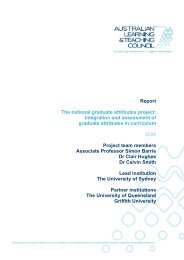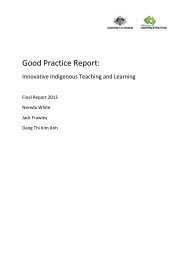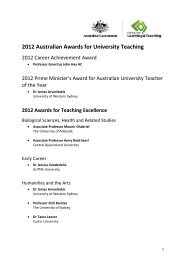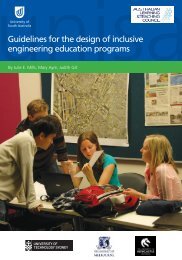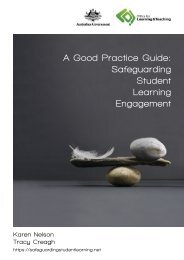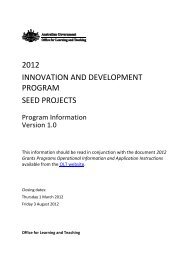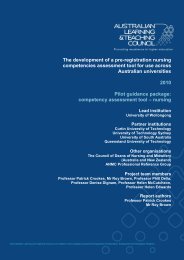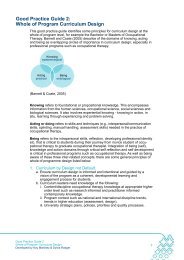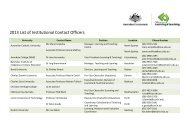national standards for psychological literacy and global citizenship
national standards for psychological literacy and global citizenship
national standards for psychological literacy and global citizenship
Create successful ePaper yourself
Turn your PDF publications into a flip-book with our unique Google optimized e-Paper software.
(derived from the science of psychology) <strong>and</strong> research (the methods of science)—thus, to<br />
push <strong>psychological</strong> knowledge <strong>and</strong> research-related skills up to the level of application (i.e.,<br />
scientific <strong>literacy</strong>), should not be too large a step to take. This more cautious approach<br />
should not take away from the goodwill conveyed by psychology educators to integrate<br />
<strong>psychological</strong> <strong>literacy</strong> <strong>and</strong> <strong>global</strong> <strong>citizenship</strong> into their curricula, <strong>and</strong> of course, some are<br />
doing just that (e.g., Griffith University, UNSW). Moreover, other disciplines (e.g., law) <strong>and</strong><br />
transdisciplinary programs (e.g., the UNSW Diploma of Professional Practice [DPP]) are<br />
utilising the concept of <strong>psychological</strong> <strong>literacy</strong>. Finally, it should be noted that well-developed<br />
<strong>psychological</strong> <strong>literacy</strong> naturally includes <strong>global</strong> <strong>citizenship</strong> (Cranney & Dunn, 2011a), <strong>and</strong> this<br />
is how the concept of <strong>global</strong> <strong>citizenship</strong> is being used in this outcome. Global <strong>citizenship</strong> is<br />
discussed further in Chapter 5.<br />
It should be noted in this section that both an aim <strong>and</strong> a strategy of this Fellowship was to<br />
allow psychology educators the opportunity to re-examine the aims of UG psychology<br />
education. In the first APEN meeting, our assertion that ‘a large number of psychology<br />
major students do not go on to become professional psychologists <strong>and</strong> <strong>psychological</strong><br />
scientists’ was challenged, so we started to collect data, which indicated that on average,<br />
fewer than half of psychology majors are admitted to Honours/Year Four (the requisite step<br />
to further PG professional psychology training). Moreover, less than half of Year Four<br />
graduates gain entry to the restricted number of PG professional psychology training places<br />
(a high proportion would be eligible). Some of those who do not gain entry to PG programs<br />
take the supervision/apprenticeship route; however, this pathway has become increasingly<br />
difficult with the recent changes enacted by PsyBA. Thus, our situation is similar to that in<br />
Britain <strong>and</strong> the USA, where there is an increasingly louder cry from graduates <strong>and</strong> the<br />
public, “What use is a psychology major?”, which also includes concerns regarding<br />
employability (e.g., Trapp et al., 2011). One answer is the liberal arts <strong>and</strong> sciences argument<br />
(McGovern et al., 2010), but the employability outcomes need to be made more explicit.<br />
Another answer is to explicitly allow the students to tie the psychology major to other<br />
minors or majors (e.g., marketing, counselling) which increase employability (e.g., Bryan et<br />
al., 2012). Still another, more controversial, answer is to consider the potential <strong>for</strong> the<br />
development of a lower-level professional role, such as the psychology assistant/associate<br />
(e.g., as is implemented now in the Australian Armed Forces). Such an outcome may also<br />
allow psychology major graduates to compete with graduates of the Vocational Education<br />
<strong>and</strong> Training (VET) sector mental health programs. A proposal that takes these ideas into<br />
account is presented in the recent Green Paper by Cranney <strong>and</strong> Botwood (2012; see Figure<br />
6), which was distributed widely in mid-June 2012, <strong>and</strong> will be discussed in upcoming<br />
<strong>national</strong> meetings.<br />
Evidence <strong>for</strong> outcome attainment:<br />
Positive ratings of intention to integrate <strong>psychological</strong> <strong>literacy</strong> into the curriculum (see<br />
Table 2);<br />
Creation of a website (www.<strong>psychological</strong><strong>literacy</strong>.com) to promote <strong>psychological</strong><br />
<strong>literacy</strong> more generally <strong>and</strong> <strong>global</strong>ly;<br />
Serious uptake of the concept of <strong>psychological</strong> <strong>literacy</strong> <strong>and</strong> curriculum innovation in<br />
psychology at Australian universities (e.g., Griffith, Monash, UniSA, USQ), inter<strong>national</strong>ly<br />
(e.g., Trapp et al., 2011) <strong>and</strong> in transdisciplinary contexts (e.g., DPP, law)<br />
Contributions to four departmental reviews where <strong>psychological</strong> <strong>literacy</strong> has been<br />
NATIONAL STANDARDS FOR PSYCHOLOGICAL LITERACY AND GLOBAL CITIZENSHIP 14


